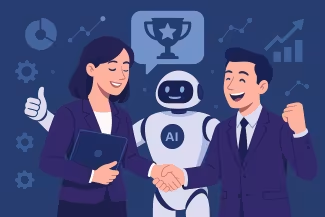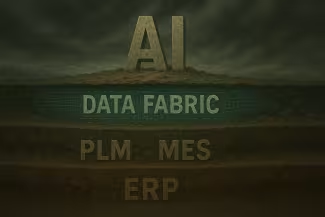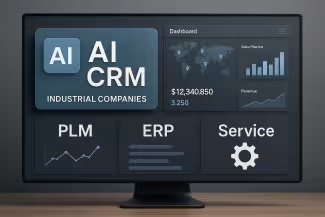AI
Artificial Intelligence
Case Study: Consultants Automate Key Processes to Remain Competitive
A 20-year Oracle consulting firm faced extinction after losing multiple RFPs to AI-ready competitors. Working at 110% capacity with $8M annual revenue, they couldn't afford traditional transformation approaches. Their solution: become AI-enhanced Oracle experts rather than AI replacements. Through Oracle's free AI certifications, internal process automation, and AI-assisted client delivery, they expanded capacity without hiring while improving proposal win rates. The key insight: AI amplifies existing expertise rather than replacing it, creating value that pure-human or pure-AI approaches cannot deliver.
Boutique Consultants: How AI Amplifies What Big Firms Can't Touch
Boutique consultants have a unique advantage with AI adoption - the ability to amplify seasoned judgment rather than replace inexperience. This guide explores using AI as a strategic thought partner for enhanced research and proposal development, plus agentic AI for automating time-intensive tasks like competitive analysis and client monitoring. The key is maintaining human oversight while leveraging AI's breadth to focus on the depth and insights clients actually value. Implementation should follow a "start small, scale smart" approach, beginning with research automation and expanding to proposal enhancement and content creation assistance.
Case Study: Medical Device Vision System - MES Integration
A leading dental manufacturer invested $25,000 in an AI vision system POC to automate FDA-required date stamp verification, aiming to eliminate costly dual signatures consuming 2 hours daily. Despite achieving zero false positives in laboratory conditions, excessive false negatives from lighting variations and magnification challenges made production deployment unfeasible. Rather than pursuing a costly pilot, the team implemented a human-centered Andon cord solution. This intelligent failure prevented $150,000+ in pilot investment while delivering strategic learning and faster operational improvements. Sometimes people remain the optimal answer.
Agentic AI in Manufacturing Demands Enterprise Foundation
Agentic AI will generate $450-650 billion annually in manufacturing value by 2030, but 80% of AI projects fail due to inadequate enterprise foundations rather than technology limitations. Unlike traditional reactive AI systems, agentic systems autonomously reason, plan, and execute complex decisions over extended periods without human intervention. Success requires evolved ERP/MES/PLM systems, real-time data mesh architectures, and comprehensive organizational transformation following the proven 10-20-70 implementation rule: 10% algorithms, 20% technology and data infrastructure, 70% people and organizational processes. Early adopters achieve 95% defect reduction and 99.5% operational uptime rates. Enterprise foundation maturity, not vendor selection, ultimately determines long-term competitive outcomes.
The Walk to AI-First Frameworks: What ERP Dudes Need to Know
After 34 years of ERP implementations, I spent four months studying AI frameworks and discovered a fundamental truth: AI must be nurtured like a young employee, not deployed like software. Sol Rashidi's research shows 70% of AI success comes from culture and team dynamics, not technology. Unlike ERP's "deploy and celebrate" model, AI requires continuous guidance and adaptation. This changes everything about assessment, implementation, and success metrics. Manufacturing and supply chain leaders need new methodologies that treat AI as a living extension of organizational values.
AI-Powered Architecture Careers 2025: Which Role Fits You?
AI is revolutionizing architecture careers. From AI-powered Enterprise Architects earning $250K+ to Machine Learning Solutions Architects designing intelligent systems, traditional architect roles are evolving rapidly. This comprehensive guide reveals how artificial intelligence impacts 11+ architecture specializations, new AI-native roles emerging, and which AI-enhanced architect career path matches your skills in 2025's intelligence-driven tech landscape.
Why 83% of Fortune 500 AI-Driven Digital Transformations Fail
Dive into why 83% of Fortune 500 companies fail at AI-driven digital transformation. This article uncovers obstacles such as missed automation opportunities, poor data quality, talent shortages, and ineffective customer AI strategies. Explore how organizations can overcome these challenges through focused automation, real-time analytics, customer-centric solutions, and robust infrastructure. Learn actionable steps for measurable, sustainable success in your AI transformation—avoid the pitfalls that cause most enterprises to fall short and maximize your technology investments.
AI-Infused ERP 2025: Redefining Enterprise Value
Top AI-infused ERP systems are delivering 106-327% ROI as leading ERP platforms like SAP, Oracle, Microsoft, and Workday transform business operations through autonomous agents. Manufacturing companies achieve 30-40% efficiency gains while supply chains see 50% cost reductions. The $4.5B market is exploding to $46.5B by 2033. Early adopters gain sustainable competitive advantages through predictive operations and intelligent automation. The shift from reactive systems to proactive AI agents represents the most significant enterprise software transformation since cloud migration.
AI-Infused CRM 2025 is Revolutionizing GTM Strategies
AI-infused CRM platforms are delivering 3.7x ROI and transforming go-to-market strategies for forward-thinking revenue teams. While 75% of organizations have adopted AI-powered CRM systems, only 23% leverage them strategically. Leading platforms like Salesforce Agentforce, Microsoft Copilot, and HubSpot Breeze enable autonomous prospect identification, predictive revenue operations, and continuous market adaptation. The competitive gap isn't linear—it's exponential, creating sustainable advantages for early adopters who implement strategically.
Pagination
- Page 1
- Next page









